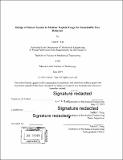| dc.contributor.advisor | Maria C. Yang. | en_US |
| dc.contributor.author | Yan, Toria F.(Toria Faye) | en_US |
| dc.contributor.other | Massachusetts Institute of Technology. Department of Mechanical Engineering. | en_US |
| dc.date.accessioned | 2020-01-08T19:44:42Z | |
| dc.date.available | 2020-01-08T19:44:42Z | |
| dc.date.copyright | 2019 | en_US |
| dc.date.issued | 2019 | en_US |
| dc.identifier.uri | https://hdl.handle.net/1721.1/123428 | |
| dc.description | Thesis: S.B., Massachusetts Institute of Technology, Department of Mechanical Engineering, 2019 | en_US |
| dc.description | Cataloged from PDF version of thesis. | en_US |
| dc.description | Includes bibliographical references (page 39). | en_US |
| dc.description.abstract | This paper discusses the process of designing and integrating a sensor that is able to detect each individual napkin removed from a napkin dispenser to aid in long term data-collection with the implementation of eco-feedback designs. With the implementation of this sensor, we would be able to evaluate the effects of various design for sustainable behavior strategies and their influence on user sustainable behavior. To create this measurement method, multiple sensor types were tested for accuracy, sensitivity, and other features before down-selecting and integrating into a final sensor design. It was determined that the use of limit switch sensors connected by a lever could be used to collect more accurate results than the current method of hand measuring inventory or taking an approximate measurement of the height of total napkins remaining. Our results were promising, as we were able to successfully trigger our sensor once at almost every instance of napkin removal as well as solve our battery capacity issue. The main task that still needs to be tweaked are the edge cases, specifically the notorious case in which one napkin is removed at a slow speed, causing bouncing and multiple triggers to occur. With this sensor in place, we will be able to collect more accurate data and better analyze the effects of positive information, negative information, and feedback designs in napkin dispensers on long term user interaction. | en_US |
| dc.description.statementofresponsibility | by Toria F. Yan. | en_US |
| dc.format.extent | 39 pages | en_US |
| dc.language.iso | eng | en_US |
| dc.publisher | Massachusetts Institute of Technology | en_US |
| dc.rights | MIT theses are protected by copyright. They may be viewed, downloaded, or printed from this source but further reproduction or distribution in any format is prohibited without written permission. | en_US |
| dc.rights.uri | http://dspace.mit.edu/handle/1721.1/7582 | en_US |
| dc.subject | Mechanical Engineering. | en_US |
| dc.title | Design of sensor system to monitor napkin usage for sustainable user behavior | en_US |
| dc.type | Thesis | en_US |
| dc.description.degree | S.B. | en_US |
| dc.contributor.department | Massachusetts Institute of Technology. Department of Mechanical Engineering | en_US |
| dc.identifier.oclc | 1135062137 | en_US |
| dc.description.collection | S.B. Massachusetts Institute of Technology, Department of Mechanical Engineering | en_US |
| dspace.imported | 2020-01-08T19:44:41Z | en_US |
| mit.thesis.degree | Bachelor | en_US |
| mit.thesis.department | MechE | en_US |
